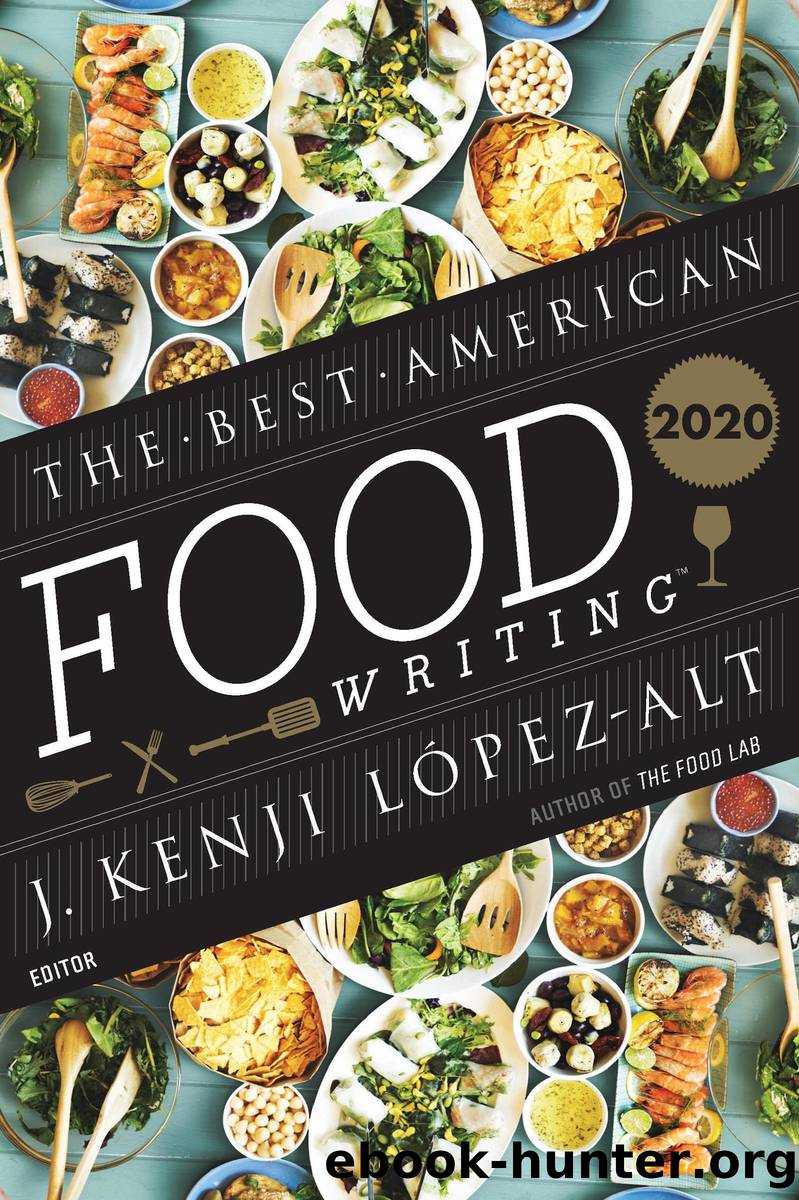The Best American Food Writing 2020 by J. Kenji López-Alt

Author:J. Kenji López-Alt
Language: eng
Format: epub
ISBN: 9780358346494
Publisher: HMH Books
Published: 2020-11-03T00:00:00+00:00
* * *
Wey was dispirited in the weeks before he went to Nashville last July to conduct research for what would become the Hot Chicken Shit dinners. âIâm doing all these projects asking white people to give something up,â he said, shaking his head. âAnd Iâm realizing they arenât going to. White people will never give anything up.â
Then he held a preliminary series of Nashville dinners. The Music City has been booming in recent yearsâeven before Amazon announced in November that it would open a new operations center thereâand the troubles of gentrification have predictably boomed with it. The transformation of such neighborhoods as East Nashville, Salemtown, and Germantown has been all but complete for years. North Nashville, a neighborhood with deep African American roots, has not yet undergone that process, but the signs are all there that itâs next up in developersâ crosshairs. After heâd been in town a few weeks, Weyâs tone changed. He had been meeting with local community leaders, city officials, and activists, he texted me, and he had seized on the notion of a community land trustâa strategy that was originally deployed to protect Black and poor farmers from losing their land. A CLT in North Nashville would take ownership of the areaâs housing stock and legally guarantee that it would remain affordable in perpetuity. In other words, Wey wanted to buy every vacant and potentially vacant residence in North Nashville.
âItâs all thatâs occupied my brain. Itâs doing my head in,â he texted, followed by two emoji heads exploding.
In hot chicken he found a characteristically potent entry point for the project: a uniquely Black food that has been flagrantly appropriated in recent years. Invented, the legend goes, by a vengeful lover of a man named Thornton Prince (who, instead of howling in pain, went on to perfect the dish, at Princeâs Hot Chicken Shack, in North Nashville), hot chicken has become so popular in recent years that the three most famous examples in the world right now are served by a white couple inside a food court in LAâs Chinatown, an Australian who was invited to serve his at last yearâs MAD Symposium in Copenhagen, and KFC.
As the neighborhood women pick at Weyâs Nigerian version at Westwood Baptist, they talk about their homes, the years in them calculated by recalling the ages of children, grandchildren, and great-grandchildren. They talk about the phone calls, the unannounced doorbell rings, the literal stacks of letters and postcards they receive every week, all from real estate speculators offering to buy their houses. And then, if theyâre uninterested in selling, the sudden wild increases in property taxes and the mysterious code violations designed to encourage cutting bait and getting out of the neighborhood. Itâs easy for white people to think of gentrification debates as being about aesthetic encroachment and individual decision-making, and so to be alternately puzzled in response (âWho doesnât like nice things?â) and defensive (âWho are we to blow against the wind?â). This was gentrification experienced as policy, as conspiracy, as existential threat.
Download
This site does not store any files on its server. We only index and link to content provided by other sites. Please contact the content providers to delete copyright contents if any and email us, we'll remove relevant links or contents immediately.
| Automotive | Engineering |
| Transportation |
Whiskies Galore by Ian Buxton(42000)
Introduction to Aircraft Design (Cambridge Aerospace Series) by John P. Fielding(33124)
Small Unmanned Fixed-wing Aircraft Design by Andrew J. Keane Andras Sobester James P. Scanlan & András Sóbester & James P. Scanlan(32797)
Craft Beer for the Homebrewer by Michael Agnew(18238)
Turbulence by E. J. Noyes(8042)
The Complete Stick Figure Physics Tutorials by Allen Sarah(7369)
The Thirst by Nesbo Jo(6937)
Kaplan MCAT General Chemistry Review by Kaplan(6930)
Bad Blood by John Carreyrou(6617)
Modelling of Convective Heat and Mass Transfer in Rotating Flows by Igor V. Shevchuk(6435)
Learning SQL by Alan Beaulieu(6283)
Weapons of Math Destruction by Cathy O'Neil(6270)
Man-made Catastrophes and Risk Information Concealment by Dmitry Chernov & Didier Sornette(6013)
Digital Minimalism by Cal Newport;(5751)
Life 3.0: Being Human in the Age of Artificial Intelligence by Tegmark Max(5551)
iGen by Jean M. Twenge(5409)
Secrets of Antigravity Propulsion: Tesla, UFOs, and Classified Aerospace Technology by Ph.D. Paul A. Laviolette(5370)
Design of Trajectory Optimization Approach for Space Maneuver Vehicle Skip Entry Problems by Runqi Chai & Al Savvaris & Antonios Tsourdos & Senchun Chai(5067)
Pale Blue Dot by Carl Sagan(5002)
